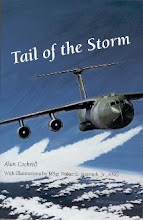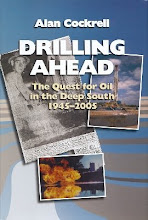This is
the worst part of the all-nighter—an
hour and a half to go, just before the
horizon ahead begins to glow. We've done well so far in the dark journey from California. A late meal, the day's paper, the daily
crossword and some lamentations about the endless management/labor
war have all served to keep us alert. But now we begin to feel the
fatigue festering behind our eyelids.
I
look over and see Andy looking out and down. He's studying something
intensely. He looks back and notices I'm watching him. He jerks his
head toward his window and smiles. “Columbus.”
I
nod. “Yup. Nice town. I hope they're—“
[yawn] “—sleeping well down
there.”
Andy
seems pensive.
“Funny,”
he mumbles. “Every time I fly over Columbus I remember something.
Comes back to me as vivid as can be, but it was a long time ago.”
When it happened Andy
was just starting out in this profession. He was a pilot for a small
freight outfit flying Navajos and Barons. He had just finished a long
hard day of flying that included an early get-up and a lot of weather
work. He was glad to feel his wheels touch down at the home plate.
But the props had hardly stopped when the boss came out and said he
must fly a load over to Indianapolis and then come back. Andy told
him he was too tired, to get another pilot. The boss said all the
others were out on assignment. He was the only one.
When
he first hired on the boss had showed him two log books to keep up.
He said, “This one is for us. This is how we pay you. This other
one is for the FAA. Make sure you don't exceed their duty limits.”
Andy was young then. He needed that job to build his time.
Andy
gave in. He helped load the Navajo and took off. The night wore on.
He couldn't believe how tired he was as he offloaded the stuff at
Indy. On the way back home he could hardly fend off the deadly nods. Then came a break in the clouds, and there, on the nose, a cluster of lights, warm and
inviting. Columbus. He flew over the university, then saw the airport
below. He had landed there many times. He knew the folks at the cargo
center. They worked round the clock and they had a nice quiet pilot
lounge with magnificent, soft recliners.
He
suddenly canceled his IFR clearance and cut the power. He spiraled
down and landed. He shut his engines down and went to the lounge. He
called his boss and said he couldn't make it any farther, that he
would sleep a few hours in Columbus and bring the plane back in first
thing in the morning. The recliner sucked him into its safe, peaceful folds and he fell asleep within seconds.
Alas,
but the part about
landing was a delusion Andy often indulges in. He never did that. He pressed on through the night and took
the plane home. Didn't have the courage to do what he wanted to do,
needed to do. Yet his many passings over Columbus in the years since
and the thoughts of sleeping in the lounge that night continue to be so
compelling he practically feels he actually did it.
And
now Columbus is to him a symbol of a safe haven never taken; a
paradise out of reach; a salvation not appropriated.
“Oh
well,” he mumbles again. “I was young.”
I nod and reflect on my own sins of omission. We
were all young once. We all paid our dues in this business. Some paid
with their lives.
We all have our own Columbus.
The
magic of the craft has opened for me a world in which I shall
confront, within two hours, the black dragons and the crowned crests
of a coma of blue lightnings, and when night has fallen I, delivered,
shall read my course in the starts.
— Antoine de Saint-Exupéry, 'Wind, Sand, and Stars,' 1939




